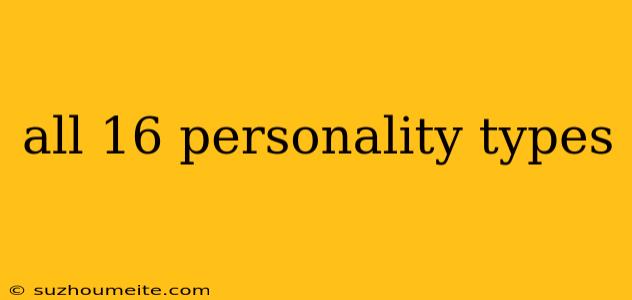All 16 Personality Types: A Comprehensive Guide
The Myers-Briggs Type Indicator (MBTI) is a widely used personality assessment that categorizes individuals into 16 distinct personality types. Each type is defined by a combination of four dichotomies:
1. Extraversion (E) vs. Introversion (I)
- Extraverts gain energy from interacting with others and prefer to be in stimulating environments.
- Introverts gain energy from solitude and prefer quiet environments where they can focus.
2. Sensing (S) vs. Intuition (N)
- Sensors focus on the concrete details and practical aspects of the world.
- Intuitives focus on abstract ideas and possibilities, looking for patterns and connections.
3. Thinking (T) vs. Feeling (F)
- Thinkers make decisions based on logic and objectivity.
- Feelers make decisions based on emotions and values.
4. Judging (J) vs. Perceiving (P)
- Judgers prefer a structured and organized lifestyle, valuing plans and deadlines.
- Perceivers prefer flexibility and spontaneity, adapting to changing circumstances.
These four dichotomies combine to create 16 unique personality types:
The 16 Personality Types
1. ISTJ: The Inspector
- Strengths: Practical, realistic, dependable, and organized.
- Weaknesses: Can be inflexible, overly critical, and resistant to change.
2. ISFJ: The Protector
- Strengths: Loyal, caring, responsible, and practical.
- Weaknesses: Can be overly sensitive, overly cautious, and shy.
3. INFJ: The Advocate
- Strengths: Insightful, compassionate, idealistic, and visionary.
- Weaknesses: Can be overly idealistic, emotionally intense, and prone to perfectionism.
4. INTJ: The Mastermind
- Strengths: Strategic, analytical, independent, and ambitious.
- Weaknesses: Can be aloof, overly critical, and difficult to work with.
5. ISTP: The Virtuoso
- Strengths: Practical, resourceful, adaptable, and independent.
- Weaknesses: Can be impulsive, reckless, and withdrawn.
6. ISFP: The Artist
- Strengths: Creative, expressive, sensitive, and independent.
- Weaknesses: Can be overly idealistic, overly sensitive, and avoid conflict.
7. INFP: The Mediator
- Strengths: Idealistic, compassionate, creative, and independent.
- Weaknesses: Can be overly sensitive, overly idealistic, and prone to self-doubt.
8. INTP: The Architect
- Strengths: Analytical, logical, independent, and inventive.
- Weaknesses: Can be disorganised, overly critical, and detached from emotions.
9. ESTP: The Entrepreneur
- Strengths: Practical, resourceful, spontaneous, and outgoing.
- Weaknesses: Can be impulsive, reckless, and irresponsible.
10. ESFP: The Performer
- Strengths: Enthusiastic, charming, spontaneous, and outgoing.
- Weaknesses: Can be impulsive, irresponsible, and superficial.
11. ENFP: The Campaigner
- Strengths: Enthusiastic, charming, creative, and idealistic.
- Weaknesses: Can be overly sensitive, easily distracted, and avoid conflict.
12. ENTP: The Debater
- Strengths: Inventive, witty, resourceful, and challenging.
- Weaknesses: Can be argumentative, impatient, and overly critical.
13. ESTJ: The Executive
- Strengths: Practical, efficient, organized, and assertive.
- Weaknesses: Can be rigid, inflexible, and overly critical.
14. ESFJ: The Consul
- Strengths: Warm, friendly, responsible, and supportive.
- Weaknesses: Can be overly sensitive, overly critical, and overly concerned with social approval.
15. ENFJ: The Protagonist
- Strengths: Charismatic, empathetic, inspiring, and persuasive.
- Weaknesses: Can be overly sensitive, overly idealistic, and prone to perfectionism.
16. ENTJ: The Commander
- Strengths: Strategic, decisive, ambitious, and assertive.
- Weaknesses: Can be impatient, demanding, and insensitive.
Understanding Your Type
Understanding your personality type can be helpful in various aspects of life, including:
- Career Choices: Identifying your strengths and weaknesses can guide you towards careers that align with your personality.
- Relationships: Recognizing how your personality type interacts with others can enhance communication and understanding.
- Personal Growth: Understanding your personality type can help you identify areas where you can improve and develop.
Important Notes
- The MBTI is a tool for self-discovery and should not be used to label or judge others.
- No personality type is inherently better or worse than another. Each type has its own unique strengths and weaknesses.
- It is essential to remember that personality is fluid and can change over time.
- The MBTI is not a definitive measure of personality, and it is important to consider other factors such as upbringing, experiences, and cultural influences.
